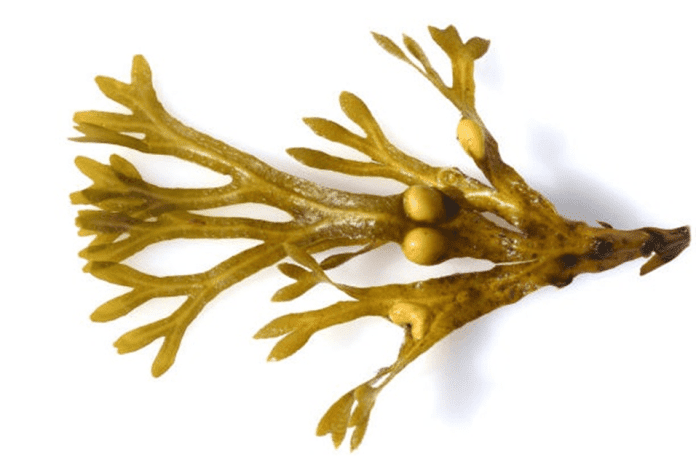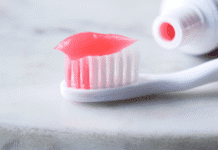Last Updated on January 22, 2026 by Rida Gul
Bladderwrack has been utilized in alternative and traditional medicine for many years, just like so many other plants found on Earth. The use of this nutrient-rich seaweed as a dietary supplement is currently growing in popularity. Bladderwrack is a type of seaweed that contains many essential nutrients and chemicals that are good for your health. It is one of the most popular seaweeds and is incredibly nutritious, especially considering how much iodine it contains. Bladderwrack supplements work similarly to kelp and sea moss in reversing nutritional deficits and enhancing general health. So benefits of Bladderwrack can’t be neglected.
Table of Contents
What Is Bladderwrack?
Fucus vesiculosus, a common seaweed, is the scientific name for bladderwrack. It goes by a variety of names depending on where it is, such as red fucus, rockweed, black tang, Atlantic kelp, bladder fucus, and cutweed.
It is a variety of brown algae distinguished by its branches’ tiny air sacs.
There is a lot of nutritional fiber, minerals, and vitamins in bladderwrack seaweed. It is harvested and consumed as food in far-eastern Asian nations and coastal Western European nations because of its excellent combination of macro- and micronutrients.
The seaweed is now becoming more popular in the U.S. due to its potential to help people lose weight and enhance thyroid health.
Benefits of Bladderwrack
Seaweed’s numerous health advantages are a result of its high nutritional value. Fucus is said to have a variety of bioactive chemicals that have antioxidant, anti-inflammatory, anti-tumor, anti-obesity, anti-coagulant, and anti-diabetes characteristics, according to research by Marine Medicines.
Let’s delve a little more into the numerous advantages of bladderwrack:
1.Offers iodine
Iodine is an essential component for the health of the thyroid and many other bodily processes. It is essential for proper growth and development as well as providing protection against certain malignancies and supporting brain function.
Consuming foods high in iodine, such as bladderwrack and other seaweeds, is a simple method to maintain appropriate levels of this crucial vitamin.
Supporting thyroid health is one of iodine’s most well-known advantages. Iodine is a mineral that the thyroid needs to produce vital hormones like thyroxine. These hormones control important metabolic processes like the synthesis of amino acids and the appropriate growth of the nervous system.
Iodine shortage can result in thyroid diseases, which can have symptoms like mood and weight swings, sluggish metabolism, and cardiac issues.
2. Contains several antioxidants
Strong antioxidants like beta-carotene, lutein, and zeaxanthin are present in bladderwrack.
A plant pigment called beta-carotene is transformed into vitamin A by the body. It is a potent antioxidant that is crucial for sustaining neurological function, improving skin health, and preserving good vision.
Antioxidants like zeaxanthin and lutein are also present in leafy greens like kale. By defending healthy cells and attempting to stop retinal damage, they contribute to maintaining good eyesight and eye health.
According to research, these antioxidants help prevent eye damage and are associated with improved cognitive function. Seaweed’s antioxidants are also applied topically to improve skin health and encourage healthy aging.

3.Reduction of Inflammation
Fucoidans, a group of sulfated polysaccharides, and other potent nutrients with anti-inflammatory properties can be found in bladderwrack seaweed. These substances have been investigated for their anti-inflammatory, immune-modulating, anticancer, and antioxidant properties.
According to research, fucoidan greatly lowers pro-inflammatory cytokines, which is thought to be how it reduces inflammation.
The brown algae is administered topically to treat burns and bug bites and is utilized as an alternative treatment for arthritis due to its anti-inflammatory effects.
4. Digestive Aids
Research shows that seaweeds are high in dietary fiber, which is one of the reasons they are healthy. When consumed, brown algae functions as a mucilage, which means that it produces a gel-like substance that soothes digestive issues such as cramping, bloating, and constipation.
In addition to relieving constipation, bladderwrack supplements and pills are utilized to detoxify the body.
Bladderwrack’s fiber content may also improve satiety, making you feel fuller more quickly and thus assisting in weight loss.
5. Good Keto Fat Burner
L-fucose chemicals found in bladderwrack are thought to have anti-obesity properties. When fed to mice on a high-fat diet, L-fucose reduced body weight increase, fat buildup, and triglyceride rise, according to one animal research.
Researchers came to the conclusion that the substance might be a cutting-edge method for treating obesity and fatty liver brought on by a high-fat diet.

6. Promotes Heart Health
Some research suggests bladderwrack supports cardiovascular health. According to a study that appeared in Oxford Academic, platelet assays using fucoidans from bladderwrack revealed that they have potent antithrombin and anticoagulant action.
Moreover, studies indicate that bladderwrack may raise HDL cholesterol levels. High-density lipoprotein, or HDL, cholesterol is regarded as the “good cholesterol” because it actually removes extra cholesterol from the bloodstream and transports it back to the liver for oxidation.
Brown algae can lower your risk of atherosclerosis and heart disease by raising HDL cholesterol.
7. May Lower Cancer Risk
According to a case study involving three women, bladderwrack seaweed may be a key dietary element behind the lower risk of estrogen-related malignancies observed in Japanese people.
After kelp administration, scientists observed notable progestagenic and anti-estrogenic effects. They came to the conclusion that bladderwrack may have anti-estrogenic effects on pre-menopausal women and lengthen the menstrual cycle when consumed dietarily.
Yet this was a case report. Well-controlled clinical trials are required to properly comprehend bladderwrack’s potential for treating breast cancer and other estrogen-related disorders.
Usage and dosage
You can eat bladderwrack as food either raw or cooked. Because of its unpleasant flavor, which has been compared to salty fish at times, bladderwrack is sometimes dried and crushed or drunk as bladderwrack tea.
It’s a herbal supplement that comes in powdered and pill form. Moreover, bladderwrack and sea moss are frequently combined in capsules or powders.
Because it is dependent on your needs and health situation, there is no recommended dosage for bladderwrack. Speak with your doctor about the right dosage and how much iodine you require for your circumstances before using bladderwrack to treat a thyroid issue or promote weight reduction.
Risks and Negative Impacts
After using bladderwrack, stop using it right once if you develop stomach pain, cramps, tightness in your chest, edema, or rash. They indicate an allergic reaction or a severe reaction.
Consuming bladderwrack might have negative or even hazardous side effects if you have an iodine allergy.
Consult your doctor before ingesting the seaweed or taking supplements containing bladderwrack if you have hyperthyroidism because you probably do not need more iodine.
When utilizing bladderwrack to treat any health problems, it is important to be aware of a number of interactions. If you are already using blood thinners, medications that break blood clots, or medications that reduce inflammation, such as NSAIDs, aspirin, and ibuprofen, fucus may not be safe to take at therapeutic levels.
Before using bladderwrack powders or supplements, anyone taking thyroid drugs such as levothyroxine, thyroid desiccated, or liotrix should talk to their doctors.
Supplements containing brown algae shouldn’t be taken by anyone who has kidney or thyroid problems without first consulting a medical practitioner.
Importance of Consulting a Healthcare Professional
Before integrating Bladderwrack into your health regimen, it’s crucial to seek guidance from a healthcare provider. While this seaweed boasts numerous benefits, including iodine supplementation and antioxidant properties, it may not be suitable for everyone. Individuals with specific medical conditions, such as hyperthyroidism or kidney issues, should exercise caution. Furthermore, potential interactions with medications should be carefully considered. Consulting a healthcare professional ensures safe and appropriate usage tailored to individual needs, maximizing the potential benefits of Bladderwrack while minimizing any risks.
Conclusion
Common brown algae called bladderwrack is prized for its iodine, antioxidant, and fiber content.
This brown algae is used to treat an iodine deficiency, enhance heart health, improve digestion, speed up weight reduction, and promote healthy aging.
It is a nutrient-rich meal that contains a variety of potent antioxidants and chemicals, like many seaweeds do.
Apart from that, if you are interested to know about A Dual Approach to Conception then visit our Health category.
















